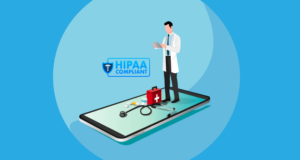In the digital age, protecting patient privacy and ensuring the security of sensitive healthcare information is of utmost importance. Healthcare providers increasingly turn to HIPAA compliant document management software to streamline their operations while adhering to strict regulatory guidelines. This article explores the benefits and features of such systems, highlighting how they help maintain HIPAA compliance.
Understanding HIPAA Compliance: What’s Behind HIPAA Compliant Document Management Systems
The Health Insurance Portability and Accountability Act (HIPAA) was enacted in 1996 to safeguard patient health information (PHI). It sets standards for:
- Electronic Exchange
- Privacy of PHI
- Security of PHI
Failure to comply with these regulations can lead to severe penalties for healthcare organizations. Maintaining HIPAA compliance involves various aspects, including:
- Secure Storage & Transmission of Documents
- Access Restrictions
- Auditing Capabilities
- Staff Training
- Disaster Recovery Procedures
Implementing a robust document management system designed explicitly with HIPAA regulations in mind can significantly simplify these requirements.
Key Features of HIPAA Compliant Document Management Systems
There are many vital components to having effective and efficient HIPAA compliant document management software for your healthcare organization.
1. Secure Document Storage
One of the primary functions of a HIPAA compliant document management system is secure storage. These systems use advanced encryption algorithms to protect data at rest from unauthorized access or breaches. Additionally, they offer robust access controls that allow administrators to define user permissions based on organizational roles or responsibilities.
2. Audit Trail Capabilities
Another vital feature of these systems is their ability to create detailed audit trails. Every action performed on a document within the system is logged and recorded, enabling administrators to track who accessed or modified a file at any given time. This ensures accountability and provides evidence in case an investigation into potential breaches is required.
3. Encryption During Transmission
Securely transmitting PHI securely is crucial when sharing documents between healthcare providers or patients. A HIPAA compliant document management system employs industry-standard encryption protocols like SSL/TLS to protect data during transit over networks or via email attachments.
4. Document Retention & Destruction Policies
HIPAA mandates that healthcare organizations retain patient records for a specific period. To comply with this requirement, document management systems offer automated retention policies that enable the organization to define how long certain documents should be retained before they are automatically destroyed. This ensures compliance while reducing the risk of accidental or unauthorized access to outdated PHI.
5. Access Controls & User Authentication
Controlling who can access sensitive health information is critical in maintaining HIPAA compliance. A robust HIPAA compliant document management system allows administrators to implement granular access controls, ensuring only authorized personnel can view or modify specific documents or sections. Additionally, user authentication mechanisms like two-factor authentication add an extra layer of security by requiring users to provide additional verification beyond a username and password.
Benefits of Implementing a HIPAA Compliant Document Software
1. Enhanced Data Security
By using a HIPAA compliant document management system, healthcare providers can significantly reduce the risk of data breaches and ensure that patients’ PHI remains confidential and secure.
2. Improved Efficiency
These systems streamline workflow processes by digitizing paper-based documents, making managing and retrieving patient records easier. This saves time and effort for medical staff while improving overall operational efficiency.
3. Cost Savings
Transitioning from traditional paper-based record-keeping methods to electronic storage reduces costs associated with printing, storing, and managing physical documents. It also minimizes the risk of lost or damaged files, eliminating costly recovery procedures.
4. Regulatory Compliance
Implementing a HIPAA compliant document management system helps healthcare organizations meet regulatory requirements effectively without cumbersome manual processes or potential human errors.
All in all, protecting patient privacy is paramount in today’s digital healthcare landscape. Utilizing a HIPAA compliant document management software offers numerous benefits such as enhanced data security, improved efficiency, cost savings, and regulatory compliance. Healthcare providers must invest in these systems to safeguard patient information while streamlining their operations.










